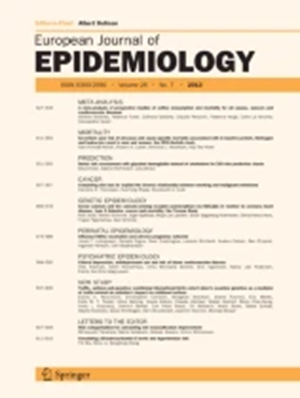用流行病学家批判的眼光看待随机试验:筛查结肠镜检查的案例。
IF 5.9
1区 医学
Q1 PUBLIC, ENVIRONMENTAL & OCCUPATIONAL HEALTH
引用次数: 0
摘要
基于来自观察性流行病学研究的令人信服的证据,结肠镜筛查长期以来一直被认为可以通过早期发现流行的结直肠癌和通过发现和切除癌前病变来预防结直肠癌的发生,从而大大降低结直肠癌(CRC)的负担。在美国,筛查性结肠镜检查的广泛提供和使用伴随着筛查年龄组CRC发病率的急剧下降,而在没有进行CRC筛查的国家,较年轻年龄组的发病率则有所上升。NordICC试验是首个报告结肠镜筛查对结直肠癌风险和死亡率的长期影响的随机临床试验(RCT),最近发表的10年研究结果被广泛解读为对结肠镜筛查有效的证据提出了挑战。这样的推理是基于这样一种信任,即在这个大规模的试验中,随机化应该可以防止任何可能影响观察性流行病学研究的残留混淆。然而,随机化不能防止其他潜在的偏倚,这些偏倚在观察性和干预性研究中都应该仔细处理并尽量减少。我们说明,这种偏差可能导致在NordICC试验中筛选效果的严重低估。观察到的模式强调需要更严格的努力来预防和纠正这种偏见,同时需要获得更多信息的筛查效果指标。这些指标应包括结肠镜筛查对早期发现常见CRC病例和预防CRC病例发生的影响的信息估计。CRC筛查的势头绝不应因对NordICC试验证据的误解而减慢。本文章由计算机程序翻译,如有差异,请以英文原文为准。
Looking at randomized trials with the critical eyes of epidemiologists: the case of screening colonoscopy.
Based on compelling evidence from observational epidemiological studies, screening colonoscopy has since long been thought to strongly lower the burden of colorectal cancer (CRC), both by early detection of prevalent CRC and prevention of incident CRC through detection and removal of precancerous lesions. Widespread offer and use of screening colonoscopy went along with a dramatic decline in CRC incidence in screening age groups in the US, in contrast to an increase in incidence at younger ages and in countries not engaging in CRC screening. The recently published 10-year results from the NordICC trial, the first randomized clinical trial (RCT) reporting long-term effects of screening colonoscopy on CRC risk and mortality, has been widely interpreted as challenging the evidence for strong efficacy of screening colonoscopy. Such reasoning was based on the trust that randomization in this large-sized trial should have prevented any residual confounding that might have affected the observational epidemiological studies. However, randomization cannot prevent other potential biases which should be carefully addressed and minimized in both observational and interventional studies. We illustrate that such biases may have led to major underestimation of screening effects in the NordICC trial. The observed patterns underline the need for more rigorous efforts to prevent and correct for such biases, along with the need to derive more informative metrics of screening efficacy. Such metrics should include informative estimates of screening colonoscopy effects on both early detection of prevalent CRC cases and prevention of incident CRC cases. The momentum for CRC screening should by no means slowed by misinterpretation of the NordICC trial evidence.
求助全文
通过发布文献求助,成功后即可免费获取论文全文。
去求助
来源期刊

European Journal of Epidemiology
医学-公共卫生、环境卫生与职业卫生
CiteScore
21.40
自引率
1.50%
发文量
109
审稿时长
6-12 weeks
期刊介绍:
The European Journal of Epidemiology, established in 1985, is a peer-reviewed publication that provides a platform for discussions on epidemiology in its broadest sense. It covers various aspects of epidemiologic research and statistical methods. The journal facilitates communication between researchers, educators, and practitioners in epidemiology, including those in clinical and community medicine. Contributions from diverse fields such as public health, preventive medicine, clinical medicine, health economics, and computational biology and data science, in relation to health and disease, are encouraged. While accepting submissions from all over the world, the journal particularly emphasizes European topics relevant to epidemiology. The published articles consist of empirical research findings, developments in methodology, and opinion pieces.
 求助内容:
求助内容: 应助结果提醒方式:
应助结果提醒方式:


